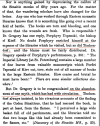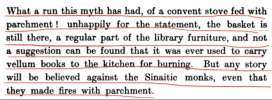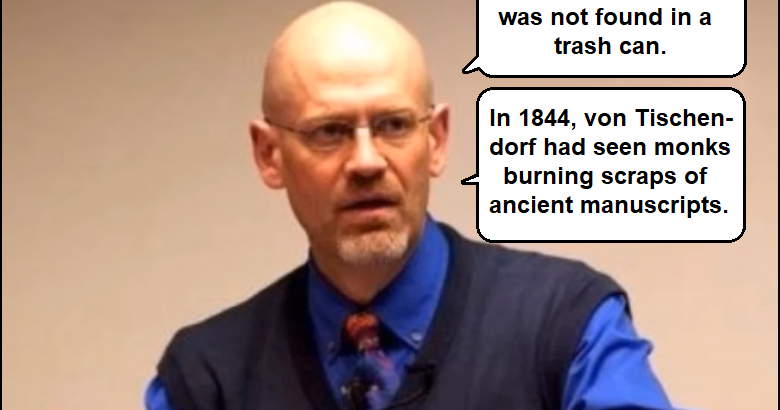Install the app
How to install the app on iOS
Follow along with the video below to see how to install our site as a web app on your home screen.
Note: This feature may not be available in some browsers.
You are using an out of date browser. It may not display this or other websites correctly.
You should upgrade or use an alternative browser.
You should upgrade or use an alternative browser.
Any here aware of KJVO views?
- Thread starter YeshuaFan
- Start date
I have. Sometimes KJV is hard to read. English has changed a lot since 1611.That would be as in the King James Only authorized bible viewpoint? and have you encountered that before?
Many, many, many times.That would be as in the King James Only authorized bible viewpoint? and have you encountered that before?
As an Independent Fundamental Baptist I'm acutely aware of KJVO views.That would be as in the King James Only authorized bible viewpoint? and have you encountered that before?
Any that would be suitable to discuss about?Many, many, many times.
Seems that many Ifo churches hold to that position regrading the Kjv ?As an Independent Fundamental Baptist I'm acutely aware of KJVO views.
That would be as in the King James Only authorized bible viewpoint? and have you encountered that before?
Seems that many Ifo churches hold to that position regrading the Kjv ?
Good morning, YeshuaFan;
Most if not all Bibles are acceptable translations. This includes the work of the scholars, translation committees, an explanation of the translation in the preface and features, etc...before the publishers will approve.
Did you know other translations tried to get published but were not approved?
I have encountered Church individuals who critiqued the NIV, KJV, The Message and other preferences, but not as a group or whole Church.
I'm curious why those who feel the KJVO view, or the KJV, the ESV are superior translations and should be the only one read. The ol explanation of "it's closest to the accuracy of the Hebrew and Greek" is dismissive and doesn't sink in with Bible students who prefer the Bible they study.
They are comfortable with their Bible translation and have been very effective in witnessing and sharing the Gospel.
My wife and I change translations from the ESV, NIV, KJV each year when we read the Bible from beginning to end. This has benefitted from cross reference Bible passages to help enhance our understanding of the text.
This is my experience, YeshuaFan.
God bless you, brother.
Some churches hold that view, but it's more individuals who hold it. There are 2 divisions within the KJVO grouping. There are the followers of Peter Ruckman who believe that the KJV translation is the inerrant preserved Word of God and is more trustworthy than the Greek text. The other division believes that translations using the Received Text or Majority Text are more trustworthy than those translated from texts compiled by Drs. Wescott and Hort. Ruckman's followers behave in a disgraceful, unchristian manner, often resorting to deception and outright lies to advocate their position.Seems that many Ifo churches hold to that position regrading the Kjv ?
My guess is it feels more authentic due to its perceived formality due to old English, e.g. thee, thou, thine, etc.I'm curious why those who feel the KJVO view, or the KJV, the ESV are superior translations and should be the only one read.
No, it's because the underlying Greek text being used for modern translations NT (including the ESV) is not considered dependable. Age doesn't guarantee authenticity. The Scriptures were being tampered with as early as the 1st century (2 Thessalonians 2:1-3) and Irenaus in the 2nd century complained about heretics altering Scripture.My guess is it feels more authentic due to its perceived formality due to old English, e.g. thee, thou, thine, etc.
The Sinaiticus text was discovered in a scriptorium garbage can. The monks didn't discard it for no reason, and the Vaticanus text had been handled by Origen who had some odd theological views, and it's "discovery" in the Vatican library just coincidentally coincided with the the Reformation and its claim of sola scriptura. Those are the key texts upon which the modern Greek texts are based despite the fact that there are thousands of other Greek texts which have proven dependable throughout history. The provenance of Sinaiticus is missing, and the provenance of Vaticanus includes the work of a person whose aberrant theological views were even criticized by his own contemporaries.
The first group would be the ones that I have usually ran into, while the second group seems to be more Kjv and TR preferredSome churches hold that view, but it's more individuals who hold it. There are 2 divisions within the KJVO grouping. There are the followers of Peter Ruckman who believe that the KJV translation is the inerrant preserved Word of God and is more trustworthy than the Greek text. The other division believes that translations using the Received Text or Majority Text are more trustworthy than those translated from texts compiled by Drs. Wescott and Hort. Ruckman's followers behave in a disgraceful, unchristian manner, often resorting to deception and outright lies to advocate their position.
My view on this issue is that based upon textual criticism and historical evidences and based upon translation process and principles. one can be Greek text [referred CT/MT or Tr, and Kjv preferred but should not be KJVO TR only, as believe good and accurate translations have came from all of those textual sources usedNo, it's because the underlying Greek text being used for modern translations NT (including the ESV) is not considered dependable. Age doesn't guarantee authenticity. The Scriptures were being tampered with as early as the 1st century (2 Thessalonians 2:1-3) and Irenaus in the 2nd century complained about heretics altering Scripture.
The Sinaiticus text was discovered in a scriptorium garbage can. The monks didn't discard it for no reason, and the Vaticanus text had been handled by Origen who had some odd theological views, and it's "discovery" in the Vatican library just coincidentally coincided with the the Reformation and its claim of sola scriptura. Those are the key texts upon which the modern Greek texts are based despite the fact that there are thousands of other Greek texts which have proven dependable throughout history. The provenance of Sinaiticus is missing, and the provenance of Vaticanus includes the work of a person whose aberrant theological views were even criticized by his own contemporaries.
I have yet to have any of those holding to KJVO tell me which KJV edition was the perfect one to use, nor which TR greek text was the perfect one to now useSome churches hold that view, but it's more individuals who hold it. There are 2 divisions within the KJVO grouping. There are the followers of Peter Ruckman who believe that the KJV translation is the inerrant preserved Word of God and is more trustworthy than the Greek text. The other division believes that translations using the Received Text or Majority Text are more trustworthy than those translated from texts compiled by Drs. Wescott and Hort. Ruckman's followers behave in a disgraceful, unchristian manner, often resorting to deception and outright lies to advocate their position.
I need to make something clear here. I'm not KJVO myself. I believe that each person who adhers to the orthodox fundamentals of the faith has the right and obligation to determine for himself which translation he is to use. However, the selection should be made through prayerful research into the provenance of translations. I'm one who uses and trusts the NKJV because it used the same underlying Greek text as the KJV with consultations of other Greek and Hebrew specimens which are placed in marginal notes. My seminary Hebrew professor was one of the OT editors for the NKJV, and he provided me with a very good explanation of the provence and translation process for that version. I myself have had some heated debates with Ruckmanites who themselves made slanderous ad hominem attacks upon that same professor, implying he was a servant of the devil. He did teach me how to research and select a good translation for me.I have yet to have any of those holding to KJVO tell me which KJV edition was the perfect one to use, nor which TR greek text was the perfect one to now use
However, I attend a KJVO church, and I can understand the need for a local church to have one standard translation for all teaching and preaching in the church. It saves the chaos created by allowing teachers and preachers to use a variety of translations to perform their duties. If you've ever tried to follow along in your Bible while a teacher or preacher was using a different translation, it can be tedious, especially if the teacher or preacher uses a dynamic equivalence translation while you're using a formal equivalence one.
I hope this kind of clears the fog. God bless you
If you've ever tried to follow along in your Bible while a teacher or preacher was using a different translation, it can be tedious, especially if the teacher or preacher uses a dynamic equivalence translation while you're using a formal equivalence one.
I hope this kind of clears the fog. God bless you
Especially when the Amplified (American Standard Version) is being used for teaching. lol!
That was my first ever Bible and it took me 8 years to finish.
I've heard the KJVO. It's a strange case to make in the year of our Lord, 2025, when you can parallel other translations and can access the Greek if necessary.
I prefer NKJV, because it's easier for my children to follow along when I read to them.
Ex. Matthew 17: 21
I prefer NKJV, because it's easier for my children to follow along when I read to them.
When you're reading different translations, do you run into the issue of "missing" verses due to manuscript differences?My wife and I change translations from the ESV, NIV, KJV each year when we read the Bible from beginning to end. This has benefitted from cross reference Bible passages to help enhance our understanding of the text.
Ex. Matthew 17: 21
I've heard the KJVO. It's a strange case to make in the year of our Lord, 2025, when you can parallel other translations and can access the Greek if necessary. I prefer NKJV, because it's easier for my children to follow along when I read to them. When you're reading different translations, do you run into the issue of "missing" verses due to manuscript differences? Ex. Matthew 17: 21
Hello cocoa;
Yes, some verses are omitted for reasons of textual criticism and others omitted or added later by copyists. If you have a "study Bible" for the NKJV it should explain omissions or adds in the footnotes.
What I find encouraging is your bringing up your children to follow along with reading to them.
As early as God's command in Deuteronomy 6:1-2, “Now this is the commandment, and these are the statutes and judgments which the Lord your God has commanded to teach you, that you may observe them in the land which you are crossing over to possess, 2 that you may fear the Lord your God, to keep all His statutes and His commandments which I command you, you and your son and your grandson, all the days of your life, and that your days may be prolonged. - NKJV
God bless you, cocoa.
Bob
I respectfully have to disagree with you BibleLover.
First, Constantin Tischendorf never said he found the text in a garbage can. He stated he saw “a large and wide basket full of old parchments.”
Second, Tischendorf wanted the codex and wanted to make himself look like the savior of the manuscript. The fact is he took it (some would say stole it) with the promise he would return it back to Saint Catherine’s monastery.
Third, biblical scholar and curator of manuscripts Professor J. Rendel Harris writing 50 years after the event:



Fourth, see Dr. Dan Wallace.
Fifth, James Snapp has a post on this topic as well as other sources.

 www.thetextofthegospels.com
www.thetextofthegospels.com
 sinaipalimpsests.org
sinaipalimpsests.org
Second, there was no coincided. Codex Vaticanus was in the Vatican Library appearing in its catalogs from 1475 and 1481. Erasmus engaged in correspondence with two individuals (i.e. Paolo Bombace and Juan Ginés de Sepúlveda) who had access to the Vatican Library and to the codex.
Many of not most scholars consider that a myth.The Sinaiticus text was discovered in a scriptorium garbage can.
First, Constantin Tischendorf never said he found the text in a garbage can. He stated he saw “a large and wide basket full of old parchments.”
Second, Tischendorf wanted the codex and wanted to make himself look like the savior of the manuscript. The fact is he took it (some would say stole it) with the promise he would return it back to Saint Catherine’s monastery.
Third, biblical scholar and curator of manuscripts Professor J. Rendel Harris writing 50 years after the event:


The Expositor
books.google.com
Fourth, see Dr. Dan Wallace.
Fifth, James Snapp has a post on this topic as well as other sources.

James White and Codex Sinaiticus
This is true of the vast majority of all manuscripts. Unless there is a colophon in the text we have no idea who copied the it or where it was done. However, we do know that it was found at Saint Catherine’s monastery. Moreover as as recently 1975 more pages of the codex have been discovered at the monastery.The provenance of Sinaiticus is missing
The Sinai Palimpsests Project | Sinai Palimpsests Project
First, there is no way Vaticanus could have been handled by Origen. Vaticanus is dated to the 4th century. Origen died in the middle of the 3rd century (ca. 253).the Vaticanus text had been handled by Origen who had some odd theological views, and it's "discovery" in the Vatican library just coincidentally coincided with the the Reformation and its claim of sola scriptura.
Second, there was no coincided. Codex Vaticanus was in the Vatican Library appearing in its catalogs from 1475 and 1481. Erasmus engaged in correspondence with two individuals (i.e. Paolo Bombace and Juan Ginés de Sepúlveda) who had access to the Vatican Library and to the codex.
This entire story is news to me, but I can say one thing with certainty and that is prior to the modern day, parchment and other forms of paper were expensive. I can't imagine anyone burning them unless they were soiled beyond repair, and that does not sound to be the case.Many of not most scholars consider that a myth.
Thank you, brother. I appreciate you correcting my misconception concerning Sinaiticus. With regard to Vaticanus, my misunderstanding was thinking it was based on the Alexandrian text. The Alexandrian text was the one which Origen influenced. God bless you and yours.I respectfully have to disagree with you BibleLover.
Many of not most scholars consider that a myth.
First, Constantin Tischendorf never said he found the text in a garbage can. He stated he saw “a large and wide basket full of old parchments.”
Second, Tischendorf wanted the codex and wanted to make himself look like the savior of the manuscript. The fact is he took it (some would say stole it) with the promise he would return it back to Saint Catherine’s monastery.
Third, biblical scholar and curator of manuscripts Professor J. Rendel Harris writing 50 years after the event:
View attachment 13149
View attachment 13150

The Expositor
books.google.com
Fourth, see Dr. Dan Wallace.
Fifth, James Snapp has a post on this topic as well as other sources.

James White and Codex Sinaiticus
www.thetextofthegospels.com
This is true of the vast majority of all manuscripts. Unless there is a colophon in the text we have no idea who copied the it or where it was done. However, we do know that it was found at Saint Catherine’s monastery. Moreover as as recently 1975 more pages of the codex have been discovered at the monastery.
The Sinai Palimpsests Project | Sinai Palimpsests Project
sinaipalimpsests.org
First, there is no way Vaticanus could have been handled by Origen. Vaticanus is dated to the 4th century. Origen died in the middle of the 3rd century (ca. 253)
Second, there was no coincided. Codex Vaticanus was in the Vatican Library appearing in its catalogs from 1475 and 1481. Erasmus engaged in correspondence with two individuals (i.e. Paolo Bombace and Juan Ginés de Sepúlveda) who had access to the Vatican Library and to the codex.
Last edited:
